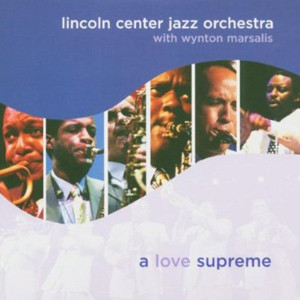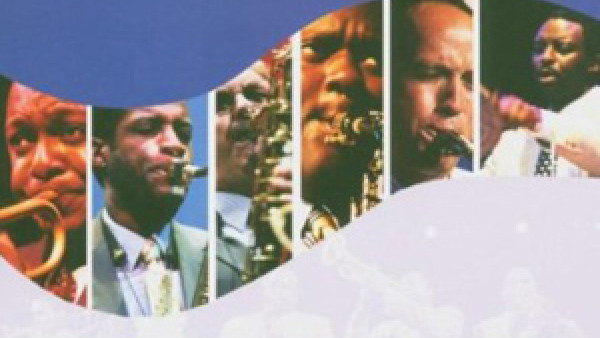Lincoln Center Jazz Orchestra Featuring Wynton Marsalis: A Love Supreme (2005)
In the last year there’s been a resurgence of interest in John Coltrane’s epochal A Love Supreme. First saxophonist Branford Marsalis’ quartet released a live DVD with an incendiary version of the suite, demonstrating with the same instrumentation how an ensemble could be reverent without being imitative, capturing the essence of the piece without sounding like a weak copy.
Now brother Wynton has addressed the piece, reinterpreting it in a larger context with the Lincoln Center Jazz Orchestra. What their version of A Love Supreme lacks in the immediacy of interplay that is really only possible with small ensembles, they more than make up for by giving the piece a broader scope and a fuller palette.
“Acknowledgement” opens with an immediate richness as piccolo, clarinet and saxophone iterate the introduction. When bassist Carlos Henriquez enters with the familiar four-note motif, Marsalis takes Coltrane’s opening theme and builds it into something more expansive as it leads into the solos. The rhythm section of Henriquez, pianist Eric Lewis and drummer Herlin Riley doesn’t try to mimic the unit of Garrison, Tyner and Jones. Lewis, in fact, is remarkably restrained, accompanying the soloists with more spacious chords that maintain a certain breadth, while providing well-positioned and sometimes outré support. Marsalis’ solo is also surprisingly restrained: no flurries of notes, just well-chosen ones that go to core of the piece, giving a new meaning to Coltrane’s simple concept.
Wynton then takes the group to church, each congregation member/instrument saying “A Love Supreme” in call-and-response fashion, leading into the piece’s finale where the theme is sung by all.
“Resolution” swings hard, but again Lewis sustains an element of space in his accompaniment, all the while uncannily in synch with every soloist. Marsalis and saxophonist Weiss Anderson may get the bulk of the solo space, but in some respects it is Lewis who is the less obvious star of the show. He provides the glue that, along with Henriquez’s warm and woody tone and Riley’s understated sense of swing—which doesn’t go for the power of Jones yet has its own energy—ties everything together. Lewis does get the opportunity for an extended solo in “Resolution” and manages to pay homage to Tyner while still maintaining his own identity.
Henriquez introduces “Psalm” with a stark simplicity that foreshadows Marsalis’ arrangement, which bases itself on Coltrane’s solo, demonstrating that improvisation can sometimes immediately become composition. Marsalis cleverly intertwines various instruments, creating a vivid sense of colour, all the while retaining the strong blues roots of the piece. While the suite ends on a larger note than the original, Marsalis manages to maintain the spiritual tranquility of the piece, with the orchestra ebbing and flowing throughout.
Dramatically proving that the barest of ideas for small ensemble can be enriched and enhanced in a larger setting, the Lincoln Center Jazz Orchestra’s A Love Supreme is a masterful interpretation. Along with Branford Marsalis’ version, it finally places the suite in the position of being a repertoire piece that can and should be limned for its inherent potential.
Visit Jazz at Lincoln Center on the web.
Track Listing: Acknowledgement; Resolution; Pursuance; Psalm
Personnel: Lew Soloff (trumpet), Marcus Printup (trumpet), Ryan Kisor (trumpet), Wynton Marsalis (trumpet), Weiss “Warmdaddy” Anderson (saxophone), Ted Nash (saxophone), Walter Blanding (saxophone), Victor Goines (saxophone), Joe Temperley (saxophone), Ronald Westray (trombone), Vincent Gardner (trombone), Andre Hayward (trombone), Eric Lewis (piano), Carlos Henriquez (bass), Herlin Riley (drums)
Record Label: Palmetto Records
by John Kelman
Source: All About Jazz


